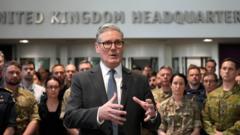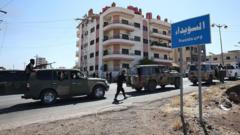In the ongoing geopolitical tensions surrounding Ukraine, Steve Witkoff, Donald Trump’s special envoy, openly critiqued UK Labour leader Keir Starmer’s recent proposal for an international coalition to ensure a ceasefire, characterizing it as merely "posturing" and lacking depth.
Trump Envoy Critiques UK Leader's Ukraine Ceasefire Proposal

Trump Envoy Critiques UK Leader's Ukraine Ceasefire Proposal
Donald Trump's representative rebuffs Keir Starmer's plan for international military support in Ukraine, labeling it as simplistic and misguided.
Witkoff, appearing on a Tucker Carlson broadcast, suggested that the notion of a united front reminiscent of Winston Churchill was overly simplistic, especially in light of NATO's existing deterrent capabilities. He expressed admiration for Russian President Vladimir Putin, whom he recently met and described as "gracious," while also echoing Russian sentiments about Ukraine's legitimacy as an independent nation. Witkoff's criticisms came after Starmer's meetings with military leaders aimed at organic support for a ceasefire in Ukraine amidst the ongoing war.
In his interview, Witkoff praised Putin's intelligence, illustrating a nuanced stance towards U.S.-Russia relations and advocating for a shift towards collaborative strategies on issues such as energy and technological innovation. He contended that the situation in Ukraine involves complex historical claims, asserting that the territories occupied by Russian forces were rightfully theirs since the Second World War. His remarks extended to disputing claims about the legitimacy of "referendums" held in these regions amid the wider context of Ukraine's conflict landscape.
Although Witkoff was charged with negotiating ceasefires with both Ukraine and Russia, he struggled to identify the five regions in Ukraine now under various stages of Russian control, which drew credibility questions around his grasp of the situation. He further downplayed the threats posed by Russia, suggesting a ceasefire might soon be realized. Nonetheless, the envoy’s comments have raised eyebrows and highlighted the complexities within international discourse on the ongoing war—a reflection of the polarized views underpinning the dialogue around Ukraine, NATO, and Russian occupation.
His remarks come at a time when international attention remains sharp on any possibility of peace in Ukraine, with widespread skepticism regarding Russia's intentions and the integrity of the territories it occupies.
As Russia's war on Ukraine continues, Witkoff’s statements emphasize the contentious narratives surrounding the conflict that often intertwine historical grievances, national identities, and geopolitical ambitions as global powers negotiate their roles in a rapidly evolving crisis.
In his interview, Witkoff praised Putin's intelligence, illustrating a nuanced stance towards U.S.-Russia relations and advocating for a shift towards collaborative strategies on issues such as energy and technological innovation. He contended that the situation in Ukraine involves complex historical claims, asserting that the territories occupied by Russian forces were rightfully theirs since the Second World War. His remarks extended to disputing claims about the legitimacy of "referendums" held in these regions amid the wider context of Ukraine's conflict landscape.
Although Witkoff was charged with negotiating ceasefires with both Ukraine and Russia, he struggled to identify the five regions in Ukraine now under various stages of Russian control, which drew credibility questions around his grasp of the situation. He further downplayed the threats posed by Russia, suggesting a ceasefire might soon be realized. Nonetheless, the envoy’s comments have raised eyebrows and highlighted the complexities within international discourse on the ongoing war—a reflection of the polarized views underpinning the dialogue around Ukraine, NATO, and Russian occupation.
His remarks come at a time when international attention remains sharp on any possibility of peace in Ukraine, with widespread skepticism regarding Russia's intentions and the integrity of the territories it occupies.
As Russia's war on Ukraine continues, Witkoff’s statements emphasize the contentious narratives surrounding the conflict that often intertwine historical grievances, national identities, and geopolitical ambitions as global powers negotiate their roles in a rapidly evolving crisis.




















